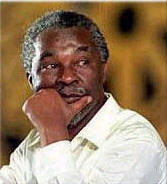 |


Played Leading Role on Rights |
|
Compiled by GayToday 
London, England--South African President, Thabo Mbeki, currently on a State Visit to Britain, played a leading role in converting the ANC to support lesbian and gay human rights, says veteran activist Peter Tatchell. It was Tatchell's dialogue with Mbeki in the 1980s that persuaded him and the ANC to abandon their homophobic stance. "Mbeki's role in changing ANC policy paved the way for the post-apartheid South African constitution to become the first in the world to outlaw discrimination against lesbian, gay and bisexual people", says Tatchell. "Although Mbeki can be justifiably criticised for his stance on HIV, he deserves recognition and praise for his pioneering commitment to queer human rights. His mistakes on AIDS issues do not diminish his important contribution to the fight against homophobia". Peter Tatchell explains the background to his dialogue with Mbeki and how it changed ANC policy: "In 1987, after nearly 20 years involvement in the anti-apartheid struggle, I was deeply disturbed by the unchallenged homophobia of leading figures in the African National Congress (ANC). My fear was that unless they were confronted, a post-apartheid, ANC-ruled South Africa would pursue the same kind of anti-gay policies that were common to most revolutionary states, such as Cuba, the Soviet Union and China.
"Accordingly, I wrote an article detailing the stridently homophobic attitudes of ANC executive member, Ruth Mompati. She flatly rejected homosexual human rights. My article was published in the London gay newspaper, Capital Gay, on 18 September 1987. I then circulated that article for republication in the gay and anti-apartheid press world-wide (including South Africa), with the calculated aim of getting the ANC inundated with protests that would (hopefully) pressure it to confront the issue of homophobia and eventually abandon its rejection of lesbian and gay equality. "My Capital Gay article led to the ANC and the official anti-apartheid movements world-wide being deluged with letters of condemnation. People were appalled that a "liberation movement" like the ANC could be so ignorant, bigoted and intolerant. The ANC leadership was hugely embarrassed. "Simultaneously, I wrote an appeal to the ANC leadership in exile in Lusaka. My letter, dated 12 October 1987, was addressed to Thabo Mbeki, then the ANC Director of Information. I chose him on the advice of underground ANC contacts. They suggested he was the most liberal-minded of the ANC leaders and senior enough to be able to push for a radical rethink of official policy. My letter was challenging, but friendly and constructive. I argued that support for lesbian and gay liberation was consistent with the principles of the ANC's Freedom Charter. "This letter, and the attendant adverse publicity from my Capital Gay article and subsequent protests, had the desired effect. Within weeks, the ANC leadership in exile began a major reevaluation of its stance on queer issues. As a result of these internal debates, the ANC renounced homophobia and officially, for the first time, committed itself to support lesbian and gay human rights. "This change of ANC policy was publicly announced in a letter to me from Thabo Mbeki, dated 24 November 1987. He personally requested that I communicate this letter to gay and anti-apartheid movements world-wide - which I did. "I then sent a copy of Mbeki's letter announcing the ANC's support for homosexual human rights to South African lesbian and gay groups (particularly the Organisation of Lesbian & Gay Activists in Cape Town - then the most radical and active gay organisation in South Africa). I also sent copies to members of the mass movement United Democratic Front, which was the main anti-apartheid coalition inside South Africa. "Securing the ANC's official opposition to homophobia gave the struggle for lesbian and gay emancipation inside South Africa added legitimacy and kudos. It was instrumental in helping persuade many organisations fighting the white minority regime - both within South Africa and world-wide - to switch to a pro-gay rights position for the first time. This led, ultimately, to the inclusion of a ban on discrimination based on sexual orientation in the ANC's draft post-apartheid constitution. "It is at least partly thanks to Thabo Mbeki that South Africa became the first country in the world to give lesbian and gay people constitutional protection against discrimination", said Peter Tatchell. |
